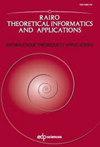On the accepting state complexity of operations on permutation automata
IF 0.5
4区 计算机科学
Q4 COMPUTER SCIENCE, THEORY & METHODS
引用次数: 0
Abstract
We investigate the accepting state complexity of deterministic finite automata for regular languages obtained by applying one of the following operations on languages accepted by permutation automata: union, quotient, complement, difference, intersection, Kleene star, Kleene plus, and reversal. The paper thus joins the study of the accepting state complexity of regularity preserving language operations which was initiated in [J. Dassow, J. Autom., Lang. Comb. 21 (2016) 55–67]. We show that for almost all of the above-mentioned operations, except for reversal and quotient, there is no difference in the accepting state complexity for permutation automata compared to deterministic finite automata in general. For both reversal and quotient we prove that certain accepting state complexities cannot be obtained; these numbers are called “magic” in the literature. Moreover, we solve the left open accepting state complexity problem for the intersection of unary languages accepted by permutation automata and deterministic finite automata in general.论置换自动机运算的接受状态复杂度
通过对置换自动机所接受的语言进行并、商、补、差、交、Kleene星、Kleene +和反转等运算,研究了确定性有限自动机对正则语言的接受状态复杂度。因此,本文加入了[J]发起的关于保持规则的语言操作的接受状态复杂性的研究。达索,J.奥顿。,郎朗。梳子,21(2016)55-67]。我们证明,对于上述几乎所有的操作,除了反转和商之外,置换自动机的接受状态复杂度与一般的确定性有限自动机没有区别。对于反转和商,我们证明了不能得到一定的接受状态复杂度;这些数字在文献中被称为“魔法”。此外,我们还解决了一般由置换自动机和确定性有限自动机所接受的一元语言的交集的左开放接受状态复杂性问题。
本文章由计算机程序翻译,如有差异,请以英文原文为准。
求助全文
约1分钟内获得全文
求助全文
来源期刊

Rairo-Theoretical Informatics and Applications
工程技术-计算机:信息系统
CiteScore
0.80
自引率
0.00%
发文量
6
审稿时长
>12 weeks
期刊介绍:
The journal publishes original research papers of high scientific level in the area of theoretical computer science and its applications. Theoretical computer science is understood in its broadest sense and comprises in particular the following areas: automata and formal languages, game theory, rewriting systems, design and analysis of algorithms, complexity theory, quantum computation, concurrent, distributed, parallel computations, verification of programs, “logic” and compilers, computational geometry and graphics on computers, cryptography, combinatorics on words.
This list is not supposed to be exhaustive and the editorial board will promote new fields of research that will be worked out in the future.
 求助内容:
求助内容: 应助结果提醒方式:
应助结果提醒方式:


